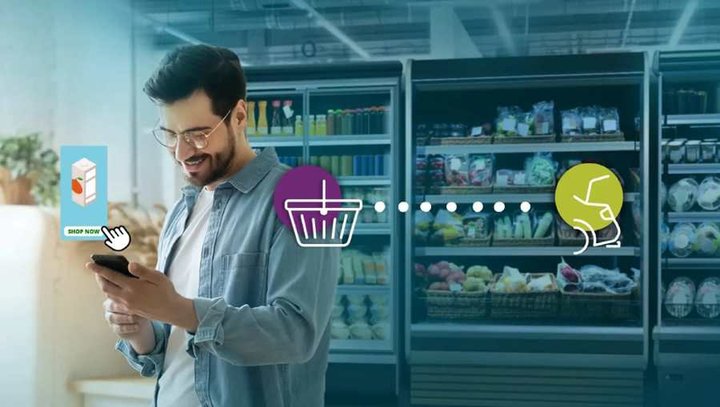
Sylvain Perrier, CEO of Mercatus, shares strategic insights and outlines the path forward while delving into Mercatus' pivotal role in the digital evolution of the grocery retail landscape.
Empowering Grocery
Retail Titans
Unpacking Digital Transformation in the Grocery Sector
Retailer Education: Navigating the Landscape of Online Grocery
Fulfilling Client Aspirations: Establishing a Robust Foundation
Actionable Insights and Customer-Centric Strategies for Profitability
Mercatus Platform's Unique Selling Proposition: Extensive Third-Party
Navigating the Future: The Path Ahead for Mercatus
ESSENTIAL NUGGETS

Within the grocery industry, which aspects of operations have undergone the most significant digital transformation, and where do you see untapped opportunities for grocers to enhance their digital capabilities and expand their digital presence?
What notable contributions has Mercatus made in shaping the market and facilitating the transition to digital, particularly for grocers who may have been slower to embrace this transformation?
Can you provide us with insights into the ongoing conversations you engage in with grocery executives who are striving to thrive in the e-commerce space? How do these discussions differ between early adopters and those who may be lagging behind?
Much of our impact revolves around championing consumer advocacy, emphasizing the importance of a robust and user-friendly shopping experience. We've played a pivotal role in helping retailers recognize the intersecting dynamics between in-store and online operations, asserting that the core concepts of the grocery industry translate seamlessly to the digital realm, garnering consumer acceptance. Simultaneously, we emphasize the importance of discerning which in-store practices may not translate effectively to the online domain, recognizing that time is a precious commodity in the online consumer experience. Our extensive efforts in educating retailers on these principles underscore their significance in driving a successful online business.
In the current economic landscape, our discussions often commence by addressing macroeconomic factors such as the impact of interest rates, labor costs, and the range of available SKUs within the store. This inevitably leads to a deeper exploration of consumer behaviors, including what they are purchasing, visit frequency, basket sizes, and unit quantities. The conversation then naturally evolves around the features and functionalities that retailers are employing to retain customers, especially considering the trend of consumers trading down in response to economic challenges. We equip them with insights and tools to align with their customers' values, often involving collaborations with third parties.
Comparing our current discussions with early adopters to those in previous years, early adopters today are more informed and educated, having had time to observe and learn from retailers with successful e-commerce programs. While their awareness is an advantage, the challenge lies in managing their appetite for a comprehensive e-commerce program all at once. Conversations shift towards strategically layering an encompassing e-commerce program that aligns with the retailer's aspirations while considering variables like cost control and profitability. Recognizing the continuous progression of consumer technology adoption, the art lies in phasing in a program with a robust foundation that meets current needs and is poised for growth as the industry evolves.
The recent pandemic and the prevailing macroeconomic conditions have instigated substantial changes, particularly in labor management within a retailer's operations, notably at the store level. Technology is gradually permeating these operations, empowering associates not only to perform their core functions but also to better serve consumers. A notable resurgence in self-service technology is observed, despite challenges related to fraudulent activity, both online and in-store. Recognizing shrink as a pervasive challenge for retailers, there is a significant opportunity to place self-serve technology directly in the hands of consumers. Additionally, exploring the synergy between technology in the hands of associates and improved communication with shoppers, whether at home or in-store, represents an untapped area of potential. As the tech-savvy boomer generation ages, particularly those comfortable with technology, there is anticipation of a transformative surge in the shopping experience, offering exciting prospects for the industry.
Mercatus has played a pivotal role in helping retailers recognize the intersecting dynamics between in-store and online operations, asserting that the core concepts of the grocery industry translate seamlessly to the digital realm, garnering consumer acceptance.



The Mercatus' platform plays a pivotal role in powering e-commerce growth and profitability for the grocers. Could you share the value that Mercatus brings to these leaders?
At Mercatus, we perceive our contribution as twofold. Firstly, it revolves around actionable insights derived from monthly industry occurrences, enabling retailers to correlate their performance with these insights. This is crucial as it empowers retailers to strategically adjust their plans, fostering profitability, customer support, and enhanced control over their programs.
Secondly, our role involves the challenging task of working with retailers to question the status quo, encouraging them to reconsider their approach to e-commerce programs and prioritize customer-centric experiences. This may involve the adoption of different technologies or solutions available in the market or even operational adjustments within their stores, all aimed at enriching the customer experience and, in turn, facilitating cost control and achieving profitability.
We call upon retailers to question the status quo, encouraging them to reconsider their approach to e-commerce programs and prioritize customer-centric experiences. This may involve the adoption of different technologies or solutions available in the market or even operational adjustments within their stores, all aimed at enriching the customer experience and, in turn, facilitating cost control and achieving profitability.


Can you elaborate on the distinctive strengths and advantages of your platform in comparison to the competition?
The Mercatus platform caters to retailers' diverse needs, providing options such as a digital native advertising integrated with Citrus ad, a critical Integrated Product Sampling program with Swish Brand Experiences, and an incredibly flexible labor model. This flexibility is made possible through our direct integrations with multiple third-party providers, including Instacart, Shipt, DoorDash Drive, and T4. Retailers can make strategic decisions, choosing between in-store labor and third-party services based on their preferences. The platform allows them to tailor their approach further, deciding whether certain stores should be affiliated with DoorDash or another group with Instacart. This adaptability underscores the Mercatus platform's commitment to providing retailers with a high degree of flexibility. Moreover, our platform boasts expansive third-party integrations, offering retailers a wide array of options to enhance their operational capabilities.
With over 60 integrations, our platform excels in providing a comprehensive solution. We offer the unique capability to earn and redeem points at checkout through seamless integration with various offer management systems, encompassing all major platforms available in the market today. Notably, our platform's remarkable feature allows users to adjust their cart at checkout, enhancing the experience, especially when clipping coupons. The exceptional flexibility of our platform is a standout quality.
Moreover, what sets us apart from the competition is the genuine commitment and expertise of the individuals at Mercatus. Our team cares deeply about their work, bringing a wealth of knowledge to their collaborations with retailers, ensuring a level of dedication that goes beyond industry standards.
How are the clients on your platform distinguishing themselves in the highly competitive e-commerce landscape?
What distinguishes Mercatus from competitors in the e-grocery sector? Why should potential clients opt to collaborate with Mercatus for their e-commerce strategy rather than other providers?
What fundamental principles do you believe will drive success for grocers in the upcoming phase of e-commerce, and how does Mercatus' platform facilitate this?
Many experts argue that e-commerce in the grocery sector is commoditized, wherein the processes of searching, adding items to a cart, and checking out become somewhat mechanical and repetitive. However, there are still significant opportunities for grocery retailers to set themselves apart in two fundamental areas.
Firstly, the reason customers choose a particular grocery store often lies in their passion for the brand and how well it aligns with their core values. Whether it's about nourishing their families, saving money, discovering new products, or experiencing exceptional service, retailers should ensure that their core brand values are prominently reflected on their website and mobile application. This can be achieved by emphasizing aspects such as helping customers save money or being the preferred neighborhood location.
Secondly, a crucial area for differentiation lies in the operational model for order fulfillment, either within the store or through delivery. Balancing quality with cost management is essential, providing an opportunity for retailers to stand out. Moreover, in cases where third-party delivery services are used, maintaining brand integrity is key. Retailers should be adaptable while holding third-party services accountable to their standards and expectations, ensuring a consistent representation of their brand values. These three factors contribute to the distinctiveness of clients on the Mercatus platform in the competitive e-commerce landscape.
Firstly, our extensive experience stands out, especially in handling large, intricate programs involving the integration of diverse third-party systems, ranging from loyalty and payment to CRM and couponing. This expertise is ingrained in Mercatus's DNA, enabling our platforms to adeptly manage complex transaction compositions and handle substantial volumes of data.
Additionally, our collaborative approach sets us apart. Unlike a belief that we can do everything, we prioritize working with other exceptional solutions prevalent in the market—many of which retailers have already engaged with. This collaborative effort extends to ERP, inventory management, CRM solutions, and loyalty programs, combining the strengths of these platforms into a unified solution. This, when placed in the hands of consumers, achieves two significant outcomes: it provides retailers with a comprehensive 360-degree view of their customers and, more importantly, ensures a seamless and frictionless buying experience for shoppers.
Mercatus' platform is designed to be unbiased and neutral in terms of third-party connections. We have integrations with notable entities like Salesforce, Eagle Eye, Instacart, DoorDash, and Shipt. Fundamentally, it equips retailers with versatile tool sets, allowing them to seamlessly interchange components. This flexibility proves crucial for operational ease within their stores, geographical areas, and, most importantly, in serving their respective communities.
The second principle revolves around the adaptability of core market technology, ensuring evolution over time. An exemplar of this is the platform's capability to assimilate diverse datasets and eventually employ regenerative AI to assist consumers. Demonstrated in certain markets, the platform can generate recipes based on ingredients in a user's pantry. Additionally, users can inquire about tailored dietary preferences, such as a 2200-calorie Keto Diet, receiving product recommendations from their preferred grocery retailer. The system then compiles these recommendations into a shopping cart. At the core of every e-commerce system is a foundational platform that must adapt to market changes, a principle embedded in Mercatus' approach.

Looking ahead, how do you anticipate the market conditions for e-grocery evolving over the next 12 months, and what implications does this hold for Mercatus’ role in the industry?
What is on the horizon for Mercatus? What strategic direction do you envision for the company and its future endeavors?
The macroeconomic landscape suggests a likely increase in interest rates, with the ten-year bond yield surpassing 5%. Recent shifts in unemployment numbers, accompanied by layoffs and ongoing geopolitical factors like the war in Israel, are poised to impact commodity prices, particularly in late fall and winter, notably affecting wheat. The repatriation of tech workers due to these global events may further influence the economy.
Despite these challenges, the resilience of e-commerce remains evident. Despite interest rate hikes over the past year and a half, there hasn't been a significant retreat from e-commerce observed since the pre-pandemic period in 2019. The latest figures for September 2023 show a substantial increase in sales, $2.9 billion to $7.8 billion. However, there's a noticeable shift in consumer behavior, with a more cost-conscious approach. Consumers are opting for smaller format sizes while maintaining similar basket values, indicating a preference for favorite products in reduced quantities.
Anticipating continued trends, the industry is likely to witness a significant shift towards in-store pickup and curbside options. Consumers are expected to leverage these services more frequently, reserving delivery for instances of extreme time constraints or when cost savings can be offset with discounts, coupons, or promo codes. Mercatus aims to play a pivotal role in facilitating these evolving consumer preferences within the dynamic e-grocery landscape.
Grocery retail has 96% household penetration rate. That's impressive and underscores the significant value that Mercatus is catering to that community. Because of the recurrent nature of consumer interactions, we at Mercatus have the ability to influence and drive engagement and conversion on behalf of retailers. However, considering the current global landscape and its likely persistence for the next 3 to 4 years, strategic adaptations become crucial.
In shaping the direction of our business, the emphasis lies in forging partnerships with organizations offering tools and applications that empower consumers to better engage with retailers, optimize their spending, and relish a frictionless shopping experience. As Mercatus functions as the glue behind the scenes, our goal is to seamlessly integrate these components on mobile or web platforms.
The evolving retail market dynamics in the United States, characterized by mergers and heightened e-commerce focus, underscores the changing landscape. Tier one retailers are simultaneously becoming more concentrated and expansive, evident in mergers like Albertsons Kroger and Walmart's intensified e-commerce efforts. While Amazon's position remains uncertain, their increasing collaborations with retailers indicate a changing landscape.
At Mercatus, we are committed to help retailers in navigating the intricate ties between technology, the economy, and consumer behavior. Identifying trends and patterns guides our mission to educate the industry through research, product release videos, and collaborative discussions. This commitment stems from our role as strong stewards, consistently understanding the intersections of technology, the economy, and consumer adoptions. By spotlighting emerging trends and fostering collaborative conversations, especially at the regional level, Mercatus aims to ensure retailers remain competitive and capable of serving their markets effectively. Exciting developments are underway, and we are eager to continue shining a spotlight on these industry advancements.
Experts argue that e-commerce in the grocery sector is commoditized, wherein the processes of searching, adding items to a cart, and checking out become somewhat mechanical and repetitive. However, we believe there are still significant opportunities for grocery retailers to set themselves apart.


Having led the company for over a decade and overseen its expansion into various countries while driving product development, could you define your leadership style?
How does your leadership adapt to the ever-shifting dynamics of the market, necessitating agility and the ability to swiftly discern and respond to market trends?
The essence of my life's purpose is straightforward. Primarily, I aim to assist individuals in their self-improvement journey, aiding them in problem-solving and guiding them toward progress. This is achieved through my commitment to mentoring, fueled by curiosity and empathy. Whether collaborating with engineers to troubleshoot or engaging in broader discussions with the exceptional individuals at Mercatus and retailers globally, I find joy in contributing without overwhelming the process. I derive satisfaction from supporting our Mercatus team members and relish insightful conversations with retailers across North America, Europe, and Southeast Asia. Exploring industry nuances, store designs, technological challenges, and economic impacts allows me not only to initiate meaningful dialogues but also to propose potential solutions. Ultimately, my success is measured by two criteria: learning something new each day and collaborating with others to co-create, an endeavor that spans a wide range of possibilities.
For leaders, it's crucial to be a history student, dedicating time to delve into geopolitical issues, cultural histories, and the early formations of countries. For instance, when confronted with current events like the Ukraine-Russia war, I immediately turn to relevant books to understand the underlying reasons. I also meticulously curate my media consumption, reading newspapers globally to grasp high-level headlines and correlate their impact on foreign policy and the business community.
Another practice I follow, both individually and with my team quarterly or semi-annually, is the pestle exercise. This strategic analysis helps us understand external forces affecting a business from political, economic, sociological, environmental, technological, and labor perspectives. Combining these practices provides a comprehensive view of the business landscape, enabling preparation for various scenarios.
For example, anticipating the potential recall of employees to Israel during a conflict allowed proactive responses to maintain service levels. This foresight, akin to having a crystal ball, extends to instances like the early pandemic labor shortages, where we recommended adjustments to retailers' web stores.
I encourage fellow executives to consume, curate, and read, emphasizing the importance of preparedness. Leveraging the diversity within our multicultural team at Mercatus is integral. By listening to their perspectives, rooted not only in their daily work but also in their backgrounds and locations, we stay adaptable to navigate crises and industry demands effectively.

Transforming Retail with ELERA
Rance Poehler, President & CEO
Toshiba Global Commerce Solutions
READ MORE


Empowering Grocery Retail Titans
Sylvain Perrier, CEO of Mercatus
READ MORE


Beyond Shelves:
From Aisles to Profits
Jason Hosking, CEO, HIVERY
READ MORE


Empowering Global Brands with Unmatched Commerce Experiences
Vanessa Cartwright, CEO North America at Astound Commerce
READ MORE






Sylvain Perrier is President & CEO of Mercatus, a leading provider of grocery eCommerce solutions. Perrier is highly sought after with over 20 years of executive-level experience in retail technology, pushing the boundaries in specialty areas such as mobile commerce, web technology, in-store operations, and Software as a Service (SaaS) architecture. In addition to his executive responsibilities, Perrier hosts the Digital Grocer podcast and is a recipient of Grocery Game Changer award by the editors of Winsight Grocery Business and was named a Top 10 Influential in Retail by RIS News. He is also RetailToday's Leadership Council member.